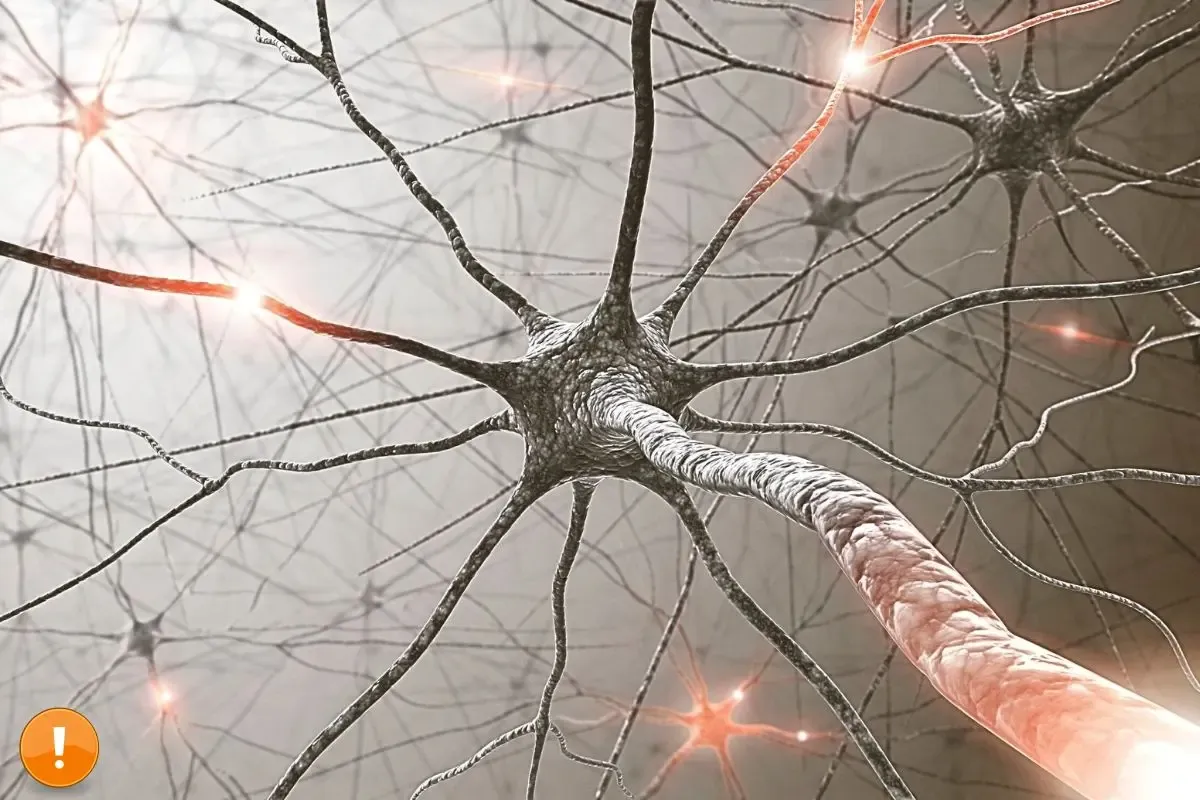Your Senior Journey
Your Senior Journey
The Unexpected Truth About Belly Fat: Vagus Nerve
Get ready to be amazed by 'The Unexpected Truth About Belly Fat: Vagus Nerve'. We uncover surprising facts as we explore eye-opening truths about the struggle against belly fat.
We might have different reasons when we try to lose weight around our belly.
It could be to look better, to get healthier, or because the doctor says it's important for our heart and other health reasons.
We step up our exercise game, hitting the gym, swimming, or just walking more. At the same time, we pay more attention to what we eat.
We might try diets like the Mediterranean one, Nordic one, or Keto.

We choose healthier foods like smoothies with lots of fruits and veggies, and we cut down on sugary snacks and fatty foods.
However, despite our efforts, we sometimes hit a plateau, unable to shed more weight. The culprit? It could very well be our Vagus nerve quietly working against us.
The Vagus nerve plays a significant role in our weight loss journey, yet many remain unaware of its impact. But don’t worry! You're not done yet. Let's discuss what it is and why it might hinder weight loss. Most importantly, learn how to activate it to finally achieve your weight loss goals.
How The Vagus Nerve Holds The Secret
The Vagus Nerve plays a significant role in how our bodies function, directly influencing stubborn belly fat. Understanding its importance can revolutionise our approach to weight loss.
The Vagus nerve, part of our nervous system, serves as a direct line of communication between the brain and vital organs like the stomach and heart.
What Is The Vagus Nerve? The Wanderer
It is a long nerve and, because it reaches so many parts of our body, it is also called the ‘wanderer nerve.’ It acts as a dedicated messenger, ensuring seamless coordination of bodily functions.
But there's more to the Vagus nerve than just transmitting messages. It quietly maintains harmony within our bodies, regulating functions like breathing, heart rate, and digestion without our conscious awareness.

Relaxation and Vagus Nerve Activation
Crucially, the Vagus nerve is primarily activated during relaxation. When we're in a relaxed state, the parasympathetic nervous system, in which it plays a major role, becomes more active.
How Does the Vagus Nerve Relate to Belly Fat?
Imagine the Vagus nerve as a special connection to the fat in our belly. It's involved in deciding how our bodies store fat, especially the fat around our stomach area.
If the Vagus nerve isn't working as it should, losing weight, especially the fat around our belly, can be a lot harder than usual.

Sympathetic Nervous System (Fight or Flight):
This system gets your body ready for action when you're stressed or scared. It makes your heart beat faster, your breathing quicken, and your muscles tense up, getting you ready to deal with danger.
When you are exercising, your sympathetic nervous system is activated.
Parasympathetic Nervous System (Rest and Digest):
This system helps your body relax and do things like digest food when you're calm and not stressed.
It slows down your heart rate, helps you breathe calmly, and gets your stomach ready to digest food properly.
Exploring the Vagus Nerve: Understand Its Key Roles in Your Body
The Vagus nerve serves several critical roles in our body. Here are its key functions:
Helps Us Relax and Digest:
The Vagus nerve is part of the parasympathetic nervous system, which helps our body relax and digest food. It slows down our heart rate, makes us breathe calmly, and aids in proper digestion.
It signals the brain when we're full, helping us control how much we eat. During relaxation and inactivity, the Vagus nerve activates the body’s ‘rest and digest’ function.
Manages Energy Balance and Fat Distribution:
It also helps keep your body's energy in check by managing how you use and store energy. The Vagus nerve controls where fat is stored in your body. If this isn't working properly, it can cause an imbalance, leading to more fat being stored in your belly.
Controls Insulin Secretion and Glucose Metabolism:
The Vagus nerve helps control the pancreas, which releases insulin. Insulin is important for managing blood sugar levels and storing sugar as fat.
So if the nerve isn't working well, it can disrupt insulin release and glucose metabolism, leading to more fat being stored in your belly.
Maintains Heart Health:
The Vagus nerve helps control our heart rate. It can slow down our heartbeat, which can be good for our heart health by lowering blood pressure and keeping our heart working well.
Keeps Inflammation in Check:
In addition, the Vagus nerve helps control inflammation in our body. This is crucial because too much inflammation can lead to health problems. The nerve sends signals that balance our immune system and keep inflammation under control.
Connects Our Gut and Brain - Affects Our Mood and Stress:
This important nerve connects our gut and brain, affecting how we feel. It's linked to parts of our brain that control mood and stress. When we stimulate it, we feel calm and relaxed, reducing anxiety and improving our mood.
Overall, the Vagus nerve plays a vital role in maintaining balance and health in our body. If something goes wrong with this nerve, it can lead to issues like digestive problems, heart issues, and mood changes.
Revealing Secrets: Key Knowledge for Women Over 50

As women age, especially after 50, the vagal system can face challenges in working properly. This can be due to hormonal changes from menopause, particularly fluctuating oestrogen levels, which can affect the nerve's sensitivity.
Stress, an unhealthy diet, lack of exercise, and chronic health issues like diabetes or heart disease can also cause the Vagus nerve to struggle.
These factors can lead to inflammation, nerve damage, or poor communication between the nerve and the rest of the body.
Additionally, natural ageing can impact nerve function, making it harder for the Vagus nerve to send signals effectively, which can disrupt many important bodily functions.
In essence, the Vagus nerve might not function well in women over 50 due to hormonal changes, lifestyle factors, and the natural effects of ageing.
This can be frustrating and challenging, but understanding these factors can help women take steps to support their Vagus nerve health and overall well-being.

WOMEN OVER 50 AND NEGATIVE FACTORS ON THE VAGUS NERVE:
Ageing
Hormonal Changes
Stress
Less Physical Activity
Medication Side Effects
Unhealthy Diet
Chronic Health Issues
Inflammation
Sleep Disturbances
Reduced Nerve Elasticity
How the Vagus Nerve Can Sabotage Your Weight Loss Efforts
The Vagus nerve is essential for managing weight, but when it malfunctions, it can impede weight loss efforts, particularly in shedding belly fat. Here's why:
1. Digestive Issues: Vagus nerve dysfunction slows digestion and disrupts appetite signals, making it challenging to maintain a healthy diet.
2. Insulin and Blood Sugar Imbalance: Poor Vagus nerve function disturbs insulin regulation and glucose metabolism, leading to fat storage, especially in the belly.
3.Increased Stress and Inflammation: Dysfunctional vagus nerve signals cause chronic stress, raised cortisol, and inflammation, hindering weight loss.
4. Energy Balance Disruption: A malfunctioning Vagus nerve alters energy storage and fat distribution, making it harder to lose belly fat and stay at a healthy weight.
Addressing Vagus nerve health is crucial for overcoming these obstacles and achieving successful weight loss.
Why It Can Stop Weight Loss
If the Vagus nerve isn't functioning properly, it can disrupt hunger signals, leading to overeating.
Causing Weight Gain
A poorly working Vagus nerve slows metabolism and increases fat storage, contributing to weight gain.
Obesity and Vagus Nerve Issues
Vagus nerve issues can impact appetite, insulin function, and gut hormones, contributing to obesity and blood sugar imbalances, especially under stress.
The Exercise-Rest-Recovery Cycle:
The Critical Role of Rest in Reducing Belly Fat
Unlocking stubborn belly fat requires understanding the exercise-rest-recovery cycle, a crucial yet often overlooked aspect of weight loss.
Many of us, eager to shed those extra pounds, ramp up our exercise routines, incorporating rigorous workouts such as HIIT training, strength exercises, or brisk daily walks.
We strive for consistency, pushing ourselves to the limit in pursuit of our fitness goals.
However, what we may fail to realise is that our bodies need sufficient rest to properly transition into the parasympathetic mode - the state of calm and relaxation.
Without adequate rest between workouts, we remain stuck in the sympathetic mode, also known as the fight or flight mode, which is counterproductive for weight loss.
The exercise-rest-recovery cycle is crucial for resetting the Vagus nerve because it allows the body to transition between states of activity and relaxation, which is essential for optimal vagal tone.

When we exercise, especially intense or prolonged workouts, the sympathetic nervous system (responsible for the "fight or flight" response) becomes activated. This activation can temporarily suppress vagal tone.
After exercising, our bodies need time to unwind and switch gears from activity to relaxation. The duration of this transition varies depending on the intensity and duration of the workout and our fitness levels.
While moderate exercise might prompt our bodies to calm down within minutes to a couple of hours, more intense sessions may require several hours for our bodies to fully relax.
So please remember to promote relaxation and recovery by balancing exercise with adequate rest, which helps activate the Vagus nerve.
Easy Tactics to Activate Your Vagus Nerve
For Effective Weight Loss
There are some easy tactics you can use to activate your Vagus nerve and aid in weight loss. Check out the following:
Vagus Nerve Exercises
Swimming: Swimming, particularly in cold water, can stimulate the Vagus nerve and promote relaxation. Cold water immersion triggers a physiological response that activates the parasympathetic nervous system.
Walking: Taking leisurely walks in nature or around your neighbourhood can be calming and help activate the parasympathetic nervous system. Focus on deep, rhythmic breathing as you walk to enhance the effects.
Manage Stress and Relaxation Techniques
Examples of relaxation exercises that can stimulate your Vagus nerve:
Deep Breathing: Take slow, deep breaths, focusing on filling your belly with air. Try to extend your exhale longer than your inhale for maximum relaxation.
Yoga: Practices like yoga, especially restorative and gentle styles, can help activate the Vagus nerve. Poses that involve deep breathing and gentle stretches are particularly beneficial.

Meditation: Engage in mindfulness meditation, where you focus on the present moment and observe your thoughts without judgment. This practice can help calm the nervous system and stimulate the Vagus nerve.
Tai Chi: This gentle martial art combines slow, flowing movements with deep breathing and mindfulness. It can help reduce stress and promote vagal tone.
Mindful Movement: Engaging in activities like qigong or gentle stretching routines can promote relaxation and mindfulness, leading to improved vagal tone.

Singing or Chanting: Singing or chanting can stimulate the muscles in the back of your throat, which are connected to the Vagus nerve. Plus, it's a fun way to boost your mood!
Laughing: Laughter is not only good for the soul but also for the Vagus nerve. Watch a funny movie, spend time with friends who make you laugh, or engage in activities that bring you joy.
Massage: Gentle massage techniques, particularly around the neck and throat area, can help stimulate the Vagus nerve and promote relaxation. At the bottom of this chapter you will find 2 videos which will explain the special massage techniques.

Prioritize Quality Sleep
Getting enough quality sleep is essential for Vagus nerve health. Aim for 7-9 hours of sleep per night. Quality sleep helps reset your Vagus nerve, allowing it to function optimally and support better stress management. For tips on how to improve your sleep naturally, check out our guide.

Adopt a Gut-Friendly Diet
What you eat matters! It's all about keeping your gut happy and maintaining your blood sugar under control. A healthy gut means improving brain-gut signals.
The brain and gut are closely linked and the gut microbiota can activate the Vagus nerve.
Here’s how you can improve your diet:
Consuming Anti-inflammatory Foods: Rich in omega-3 fatty acids, such as fish (salmon, sardines), seeds, and nuts.
Choosing High-Fibre, Low-Fat Foods: Fibre promotes digestive health, aids in weight management by promoting a feeling of fullness, and helps stabilize blood sugar levels. You can find fibre in fruits, veggies, oats, whole-grain pasta, beans, nuts, and potatoes with the skin on. Going for whole, unprocessed foods can help create a happier, healthier gut.
Consume Fermented Foods: Fermented foods like kimchi, Greek yoghurt, and sauerkraut have a positive impact on the human microbiome.

Eating Foods Rich in Polyphenols: These antioxidants protect your body against damage caused by free radicals. Examples include berries (such as blueberries and strawberries), dark chocolate, green tea, red wine, apples, and vegetables like spinach and broccoli.
Reduce Sugary Foods: Consuming excessive amounts of processed sugar and refined products can lead to inflammation, potentially decreasing the beneficial bacteria in your gut.
Increase Water Intake or Opt for Herbal Teas: Proper hydration is essential for maintaining gut health, ensuring that food maintains the appropriate consistency for seamless digestion as it moves through the digestive tract.
Reduce Ultra-Processed Foods: Decreasing your intake of processed foods is vital for maintaining gut health. These foods contain additives like preservatives and are often low in fibre, disrupting the balance of bacteria in your gut and potentially causing inflammation.
Use Olive Oil Instead of Butter: Olive oil contains healthy monounsaturated fats, which are beneficial for heart health and can help lower cholesterol levels.
Incorporate Probiotics: Boost your gut health by consuming probiotic drinks containing live cultures, often referred to as "good" or "healthy" gut bacteria.
Include Prebiotic Foods: These supply the essential fibre that nourishes and encourages the development of beneficial gut bacteria. Bananas, garlic, onions, chicory, asparagus, Jerusalem artichoke, and whole grains are among the prebiotic-rich foods that you can add to your meals.
And remember, the EXERCISE-REST-RECOVERY CYCLE is crucial. Resting between physical exercises is essential to reset your Vagus nerve.
Conclusion: Maximise Your Weight Loss Success
By Tapping Into The Valgus Nerve
What a fantastic way to enhance your weight loss journey! Initially, it might seem like a joke – thinking all you need is a healthy diet and vigorous exercise.
Sure, ditch the sugar, be mindful of fats (opt for healthy ones like olive oil and avocados), and have a handful of nuts for snacks. But an often overlooked yet crucial element for weight loss is stimulating your Vagus nerve.
Stress management through deep breathing, meditation, and other relaxing activities can make a significant difference.

Swimming, taking leisurely walks, and ensuring you rest properly within your exercise routine are all beneficial.
By focusing on the health of your Vagus nerve, you enhance your chances of long-term weight loss success. Incorporating the above exercises, relaxation techniques, and proper rest into your routine can lead to better weight management.
A healthy Vagus nerve helps maintain a balanced approach to weight loss, ensuring you keep the weight off for good. Embrace these strategies and enjoy a more holistic, effective path to achieving and maintaining your ideal weight.
I’d love to hear about your weight loss journey. What steps did you take to keep the weight off? Feel free to reach out through the contact form – your experience could inspire and help others!
Stay Updated - Sign Up for Our Newsletter
Stay informed with expert advice for women over 50, right in your inbox. Join us!

About the author
Birgit is the heart behind Your Senior Journey, on a mission to prove that your 50s and beyond can be your most vibrant, fit, and emotionally fulfilling years yet. She doesn't just write about well-being; she empowers women to break free from the "juggle," reclaim their physical vitality, and build relationships that truly flourish.
When she isn't writing, Birgit finds joy in teaching the piano, nurturing her garden, and cherishing time with her family. These moments of creativity and connection bring depth to her work and fuel her passion for helping others thrive.
Your Senior Journey - Supporting women over 50 through life's changes with confidence and healthy living.
© 2026 - yourseniorjourney.com - all rights reserved.


